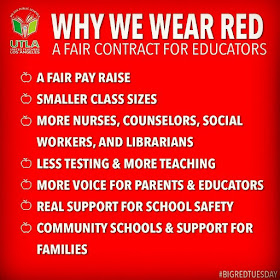'There's no paper in the classroom': why Los Angeles teachers are moving toward a strike
Following high-profile teacher walkouts across the country, LA teachers voted to strike over school funding, wages and class sizes
At the start of the 2018-19 school year, members of the Los Angeles teachers’ union overwhelmingly voted to authorize a strike, granting the union board the authority to approve a walkout as the union and school district continue to negotiate a new contract. The strike authorization provides the union with a possible tactic to leverage a variety of demands over the second largestschool district in the nation.
This year, teachers have gone on strike in Arizona, West Virginia and Oklahoma with varying degrees of success. Arizona teachers received a 19% pay raise after a five-day walkout in May. West Virginia teachers ended their nine-day strike after receiving a 5% pay raise in March. Oklahoma teachers’ nine-day strike pushed their state legislature to pass an annual $6,100 pay increase and devote $500m to education funding.
The United Teachers of Los Angeles, the union of the city’s public school teachers, are demanding the school district increase education investment, hold charter schools accountable, take efforts to reduce class sizes, improve school safety and reduce the quantity of mandated standardized tests in addition to increasing wages by 6.5% for teachers.
“It seems clear talking to over 1,000 teachers in the district that the big issue for teachers in the Los Angeles unified school district is class size, easily at the top of the list. It’s gotten out of hand,” said Elgin Scott, a teacher at Los Angeles’ Taper Avenue elementary school, in an interview. According to Scott and other teachers the Guardian spoke with, it’s not uncommon for Continue reading: 'There's no paper in the classroom': why Los Angeles teachers are moving toward a strike | US news | The Guardian




















